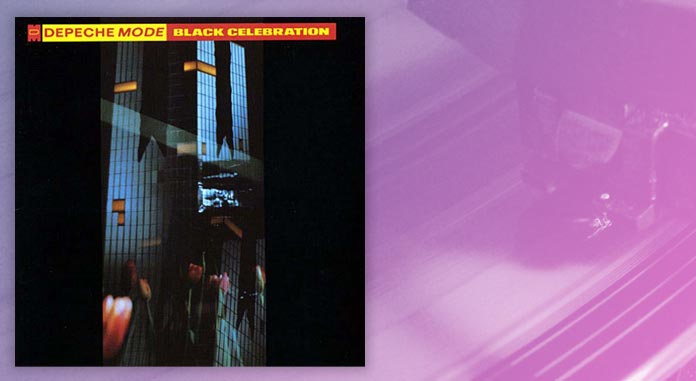Waxing Nostalgic Connecting The Dots: Depeche Mode, “Black Celebration”
Published on December 4th, 2013 in: Music, Waxing Nostalgic |The doom and gloom of Eighties music, which arguably began with the appearance of The Smiths (see last week’s article), stayed relegated to the underground for most of the decade. Bands like Bauhaus and The Damned morosely swayed around the borders of the Alternative Nation, not gaining widespread recognition in America until much later. Depeche Mode, a four-piece band from Essex, managed what seemed at the time to be impossible; not only did they gain the respect of the Goths and Gloomers of the time, they also achieved mainstream success through the heavy rotation of their music videos. The reason for this was simple.
They were pretty.
There’s never been a lack of pretty boy bands, especially in the Eighties, when androgyny was the key. Culture Club pushed that boundary, as did The Human League. We haven’t even approached my horrible demon-love for Duran Duran. Depeche Mode were pretty in a different way, though. They were little malnourished kids from Basildon with a couple of synthesizers and a ridiculously bleak outlook on life.
Original member Vince Clarke leaned more towards poppy club sounds. He left the band and formed Erasure. Without his influence, Depeche Mode turned towards the dark side. Lead singer David Gahan, his head precariously perched on his ostrich neck, crooned his way through a virtual cemetery of concepts. Martin Gore, with his two-toned hair and a falsetto like a fallen diva, played danceable dirges in the key of mourning. Alan Wilder and Andy Fletcher brooded forlornly in the background, a Greek chorus of ribcages.
The album Black Celebration made depression beautiful. Listeners always had the inkling that Depeche Mode wasn’t the kind of band to get high on life. Black Celebration confirmed that fact, chiseling it in stone and holding it high, like a wan Moses on Mt. Sinai.
There was an insidious nature to the album. The songs ventured deeper into industrial territory, songs linked with hissing steam and the sound of a car engine starting. It’s easy to hear the influence of this album, a mere ten years later, in nine inch nails’ The Downward Spiral, both texturally and lyrically.
“Death is everywhere!” Gahan proclaims in the song, “Fly on the Windscreen.” It is, too; Death is a person on this record, looming over everything happens, making even the love songs terrible dark things that bump uglies in the night. “It doesn’t matter if this all shatters. Nothing lasts forever,” sings Gore in “It Doesn’t Matter Two.” How’s that for a sweet “I love you?”
Black Celebration is all resignation and Death and despair and Death, with some self-destruction thrown in for good measure and, by the gods, it is beautiful. It is a sit down and listen all the way through kind of record. While it may not resonate lyrically on the literary level that any Smiths album does, it wears its broken heart on its album sleeve like a plaster cast. It reminds the listener that every day is a battle, and if you make it through that, well done.
And if you decide you don’t want to make it through any more days, that’s an option, too. Depeche Mode isn’t going to judge you. They’re not lamenting things from somewhere up above it all. They’re right there with you, in the pit, with their Synclaviers, just trying to make it from minute to minute.
Existence can be a burden and a bore. It’s one thing to have a band that empathizes with you about it; it’s quite another to listen to a band, especially one as pretty as Depeche Mode, that understands it.
Remember, you can check out the Waxing Nostalgic series on the Spotify Waxing Nostalgic Playlist!

Time limit is exhausted. Please reload the CAPTCHA.